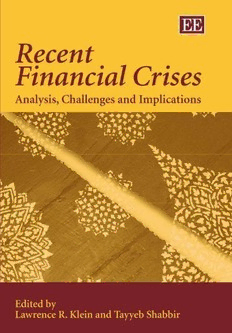
Recent Financial Crises: Analysis, Challenges and Implications PDF
345 Pages·2007·1.608 MB·English
Most books are stored in the elastic cloud where traffic is expensive. For this reason, we have a limit on daily download.
Preview Recent Financial Crises: Analysis, Challenges and Implications
Description:
Financial crises are recurring phenomena that can cause significant economic and societal loss. This book is therefore vitally important as it analyzes why and how financial crises occur, the extent of their impact, and what can be done to prevent their recurrence or reduce the damage they cause. Comprising original and never-before-published papers by distinguished economists, this book offers insights about lessons that were or should have been learned from recent outbreaks of such crises in East Asia and elsewhere.Recent Financial Crises also presents a set of econometric studies of issues such as labor market behavior, investment and productivity, and exchange rate adjustments. Although China did not have a crisis, its economic behavior was closely monitored in order to see if that had any effect on the crisis conditions. In this respect, the book contains an estimation of China's `core' inflation rate, as well as its `true' cost of living index, over a 20-year period spanning the Asian financial crisis. In general, collectively, the studies point to a need for ongoing structural reforms to minimize vulnerability to crises or soften their impact. The necessity for resorting to viable safety nets is also stressed.Policymakers and central bankers will find this book of great value, as will scholars and researchers at many levels of academe, involved in financial, business, and international economics.
See more
The list of books you might like
Most books are stored in the elastic cloud where traffic is expensive. For this reason, we have a limit on daily download.
